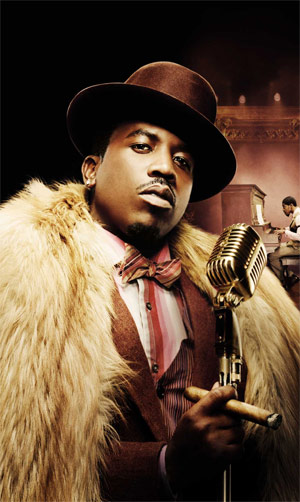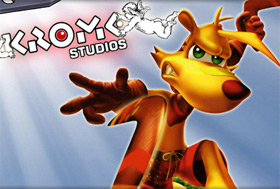An interview for The Vine: face-to-face with Big Boi in Sydney. The full interview appears below.
 Big Boi – interview
Big Boi – interview
In Australia for one night only to promote the new Need For Speed: Hot Pursuit video game, American hip-hop artist Antwan “Big Boi” Patton had been booked wall-to-wall with media commitments from the moment he arrived at the Hordern Pavilion. From 1pm onwards, he was being filmed, questioned, and photographed by an extensive media contingent, all eager for a moment in the presence of one half of the multi-million selling duo OutKast. In the hall adjacent, a few million dollars’ worth of cars are having their tires kicked – though not literally, as they’d probably be escorted from the building – by a couple of thousand gig attendees, all of whom were offered free tickets through a variety of web outlets. Initially access was only guaranteed to those who pre-ordered the new game, but in the weeks leading up to the event, it seems that EA and their partners couldn’t get rid of the tickets fast enough. Indeed, at the height of Big Boi’s kickarse, hour-plus-long set, the Hordern was only about half full.
Before the show, The Vine was initially scheduled for 10 minutes with Big Boi in a space upstairs at the Hordern that’d been designated as the venue’s green room. In actuality, it was a room flanked with thick black curtains, long tables, and a couple of dozen people milling around. A curious combination of anticipation, expectation, and desperation hung in the air. Only two chairs were set up, atop one of which sat Big Boi in front of a television, an Xbox 360, and the new Need For Speed game. The other seat was warmed by a revolving door of interviewers, most of whom were committing their conversation to video. This wouldn’t be a problem if each team filming used the same chair, game banner and lighting set-up, but of course, it’s never that easy. The Vine watched as a half-dozen video teams – mostly Australian, but a couple of New Zealanders, too – generally spent more time re-arranging the set than they did actually speaking to Big Boi.
It’s past 8pm when my interview opportunity arrives, and by that time, I could tell that the rapper was well and truly over posing for photos and answering the same five questions. I’m informed that since they’re running behind schedule, my time with Big Boi has been cut in half. Great! “Try and keep it close to that five minute mark,” his tour manager tells (warns?) me; “We wanna get him to relax a little bit before the show.” And fair enough. I’d moved the chairs a few metres away from the television because I wanted his full attention, but his tour manager insists that they be moved back, directly in front of the screen. Big Boi mishears my name (“Anthony?”), shakes my hand, picks up a controller and turns his sunglass-clad eyes to the game, where he’s driving a yellow Lamborghini at high speed through a beautiful, snowy mountaintop setting. This will take some skill.
—
“So I hear you’re a bit of a gamer,” I begin.
“Yeah, man,” he replies. “I do a little somethin’ here and there, you know.” Eyes on the screen. Mind more interested in the game than in speaking with yet another journalist he’ll never meet again.
“I’ve got this theory,” I offer. “Games are now cool, where once they used to be nerdy. What do you think?”
“I think you might be right,” Big Boi says. Still disinterested.
“Could you imagine this kind of event ten years ago?” I ask.
“Not really. But you know what happened when the games started integrating the hip, new, cool music into the games, they brought music and gaming together. So you’d have fans of music playing games, and it brings everyone together. So now you have the coolest people playing games, and so it’s not looked at as just being the ‘nerd thing’. Everybody secretly loves video games. For real!”
I try a little flattery, to try and get him to lighten up. “And the fact that companies like EA want to bring guys like you out to promote their game probably helps their cool factor a little bit.”
“Hey, man, I hope so!” he smiles for a moment – then jumps back into contractual obligation-mode. “This is a cool game, though. I like this. Need For Speed – they are not playin’ around, you hear me?” The way he says this is hilarious, but I get the feeling he’s said it dozens of times today. “The police car’s a Lamborghini; this shit is super fast!”
I make another attempt to divert his interest from the screen. “Did you check out the cars next door?”
“Yeah, I was over there earlier, man. I was doing some interviews for MTV, and I saw the Lambos, and the car that’s made out of gold, and all that stuff.”
Well, that’s a conversational dead end. I’ve already spent a minute on pleasantries. Shit. Time to try something different. His July-released debut solo album, Sir Luscious Left Foot: The Son Of Chico Dusty (review), is fucking fantastic. Hell, my friends and I flew down from Brisbane just to see him play these songs live; nevermind this interview, which was only confirmed the day before. I need to communicate my enthusiasm; I need to show him that I respect his work. “Congrats on the album,” I offer.
“‘Preciate it,” he acknowledges briefly. Then bang – straight back into promo mode. “Did you get a chance to play this yet?” he asks
“No, man,” I reply, starting to get a bit annoyed with his diversionary tactics.
“You ain’t played it yet? This is pretty kick-ass. You’ve gotta get a chance to play it!”
With all due respect, Big Boi, I can play the game any time I want. What I can’t do at any time is interview you, which is the whole reason I’m sitting here. I press him on the topic of his music. “I’ve got this theory about your album.”
“Okay,” he replies, eyes still on the screen.
At this moment, it’s like 8 Mile all up in here; I’ve only got one shot. Here goes. “One of the reasons why it works so well is because you use your multiple personas to shrink and exaggerate your personalities as you need to.” I made this comment in my album review for The Vine – though he’s Big Boi through and through, on the album, he makes frequent references to several alter egos.
It works. “There you go!” he says, looking at me through his sunglasses for the first time. “I’ll pause the game on that! Yeah, yeah! Exactly.” He nods. “That’s good!”
I’m pleased to be sharing eye contact with him, if nothing else. “You think that’s a valid point? You’ve got your Daddy Fat Sax, you got your Sir Luscious Left Foot…”
“General Patton…” he begins, listing another persona.
I jump in with a name he drops midway through a verse in the album’s standout track, ‘Shutterbugg’. “Sergeant Slaughter,” I say, and from this moment on, I have his full attention for the remaining three minutes.
“Exactly. It’s actually just different parts of your personality [that allow you] to be extreme on different types of songs. You don’t have to be the same person on every record. You can, like you say, exaggerate it or shrink it as you see fit.”
Does that also come down to you being a bit restless, creatively? You want to challenge and expand yourself?
“Definitely. It’s about playing roles. In certain songs, you can get into role-play. ‘Cuz really, the music is an extension of you, and I look at ‘em as like diaries, from the last time you heard from me, until the new album was released. So now that Sir Luscious Left Foot is out, all the content that’s building now is for the Daddy Fat Sax album, you know what I’m saying? [Note: Daddy Fat Sax: Funk Soul Crusader is said to be released next year.] So you really just talk about things that affect you, from relationships, to politics, to… whatever. Things you might want to speak out on. Sometimes it might be some good ol’ down-low freaky fun, just to get funky wit’ it. And nasty, and gritty, and grimy.”
And there’s no shortage of those kind of songs on the album.
“No. I definitely keep my shit freaky, all the way. Always. You know what I’m saying? Real edgy. You can work out to it. You can definitely make love to it. You can have a real sex party to the album. A real, real sexy party. Most definitely!”
I saw the behind the scenes footage for the ‘Shutterbugg’ video, where you mentioned that you were aiming to do videos for every track on the album. How’s that coming along?
“It’s coming along good. Next up I got the ‘Tangerine’ remix, with Fabolous, Rick Ross, and Bun B. And I already shot the video for ‘The Train Part II (Sir Luscious Left Foot Saves The Day)’. That’s already been done. Probably gonna do them two next, then I’m thinking about ‘Hustle Blood’ and ‘Be Still’.”
You’ve gotta get Janelle in on ‘Be Still’. [In reference to R&B singer Janelle Monáe, who provides guest vocals on the track.]
“Most definitely.”
On behalf of music fans across the world, I want to thank you for discovering Janelle Monáe. [Big Boi saw her perform Roberta Flack’s ‘Killing Me Softly’ at an open mic night in Atlanta, and he asked her to feature on two songs on OutKast’s Idlewild soundtrack. Full story here.]
“Word, man. ‘Preciate it, man.”
She’s something special.
“Definitely. It’s all about real, organically-made music that you can discover; every time you listen to it, you can hear something new. You don’t get everything on the first listen. A type of artist like that, with that type of depth; that’s what we’re looking for.”
She’s coming out here for the first time in February, for the Good Vibrations festival.
“Word? Oh, that’ll be dope, man. She got a lot of energy.”
I saw the clip for ‘You Ain’t No DJ’, with Yelawolf. I’m interested to know your take on censorship these days, because in that video, Yelawolf’s verse is like…
“Chopped up.”
Yeah, you can barely hear the fuckin’ thing.
“It really is some bullshit, man, you know what I’m saying? They show everything on television, you know, and in movies you can do whatever you want to do. But they censor the music, when it’s all the same thing. To me, I think it’s all really to hamper the success of certain types of music, you know what I mean? But the fans go out and get the dirty versions, and check it out, but I mean, you can work past all that.”
And even the logos on your caps and shirts are blurred out, too.
“Yeah. That’s weak as hell.”
I think the best example recently is Cee-Lo’s ‘Fuck You’, where the radio cut is ‘Forget You’.
“Yeah, and it totally takes away the impact. He still had almost a million downloads, though.”
Yeah, massive. I think we’re about out of time, unfortunately.
“That’s alright. We’re just getting ready to hit the stage.”
Before I go: who’ve you got here in your entourage tonight? Who are you playing with?
“I just brought my DJ, Cutmaster Swiff, and my homeboy BlackOwned C-Bone. And my sound man, my road manager. Micro squad.”
No Vonnegutt? [an Atlanta rock act who feature on Big Boi’s track ‘Follow Us’ – video]
“Nah, Vonnegutt didn’t come. They just performed with me down in Tennessee, though.”
Cool. When are you coming back for a proper album tour? You’ve been here for the Winterbeatz festival, but you missed Brisbane.
“Probably be like, um… me and Cee-Lo gonna do this ‘Georgia Power’ tour, and we might come back over and do some dates for that.”
Alright. Thanks for your time.
A Matter Of Size: The State of Triple-A Game Development in Australia
 Play games. Read books. Watch movies. Understand your world, so that when you’ve learned some hands-on, practical skills, you have ideas to make new, exciting forms of games. Generate your own enthusiasm, and your own, new industry. Don’t go and be a little worker; go and make your own world. I think games are just beautiful. Design is powerful. Game design is utterly powerful. You’re playing with culture and philosophy and fun and image and audio; the whole kit and caboodle. Don’t just think about making new forms; think about pushing the boundaries with it.
Play games. Read books. Watch movies. Understand your world, so that when you’ve learned some hands-on, practical skills, you have ideas to make new, exciting forms of games. Generate your own enthusiasm, and your own, new industry. Don’t go and be a little worker; go and make your own world. I think games are just beautiful. Design is powerful. Game design is utterly powerful. You’re playing with culture and philosophy and fun and image and audio; the whole kit and caboodle. Don’t just think about making new forms; think about pushing the boundaries with it. One of the big things we look for when we’re interviewing people is their portfolio. Whether it be as an artist showing your work, or a programmer and having a playable game; that just puts you so far ahead of other people when you’re applying for a job. And even a designer, if you have a little walkthrough video. One of the guys we hired at Krome for Ty the Tasmanian Tiger 2 – Rob Davis, a graduate, who’s now working at Microsoft Games Studios in Seattle – he had a walkthrough of a Ty The Tasmanian Tiger level that just blew everyone else away. He’d thought about it, and made a level up. He couldn’t program, or really do art, but he did a simple little walkthrough video, and explained his thought processes. That was amazing. It gave him such competitive advantage.
One of the big things we look for when we’re interviewing people is their portfolio. Whether it be as an artist showing your work, or a programmer and having a playable game; that just puts you so far ahead of other people when you’re applying for a job. And even a designer, if you have a little walkthrough video. One of the guys we hired at Krome for Ty the Tasmanian Tiger 2 – Rob Davis, a graduate, who’s now working at Microsoft Games Studios in Seattle – he had a walkthrough of a Ty The Tasmanian Tiger level that just blew everyone else away. He’d thought about it, and made a level up. He couldn’t program, or really do art, but he did a simple little walkthrough video, and explained his thought processes. That was amazing. It gave him such competitive advantage.
